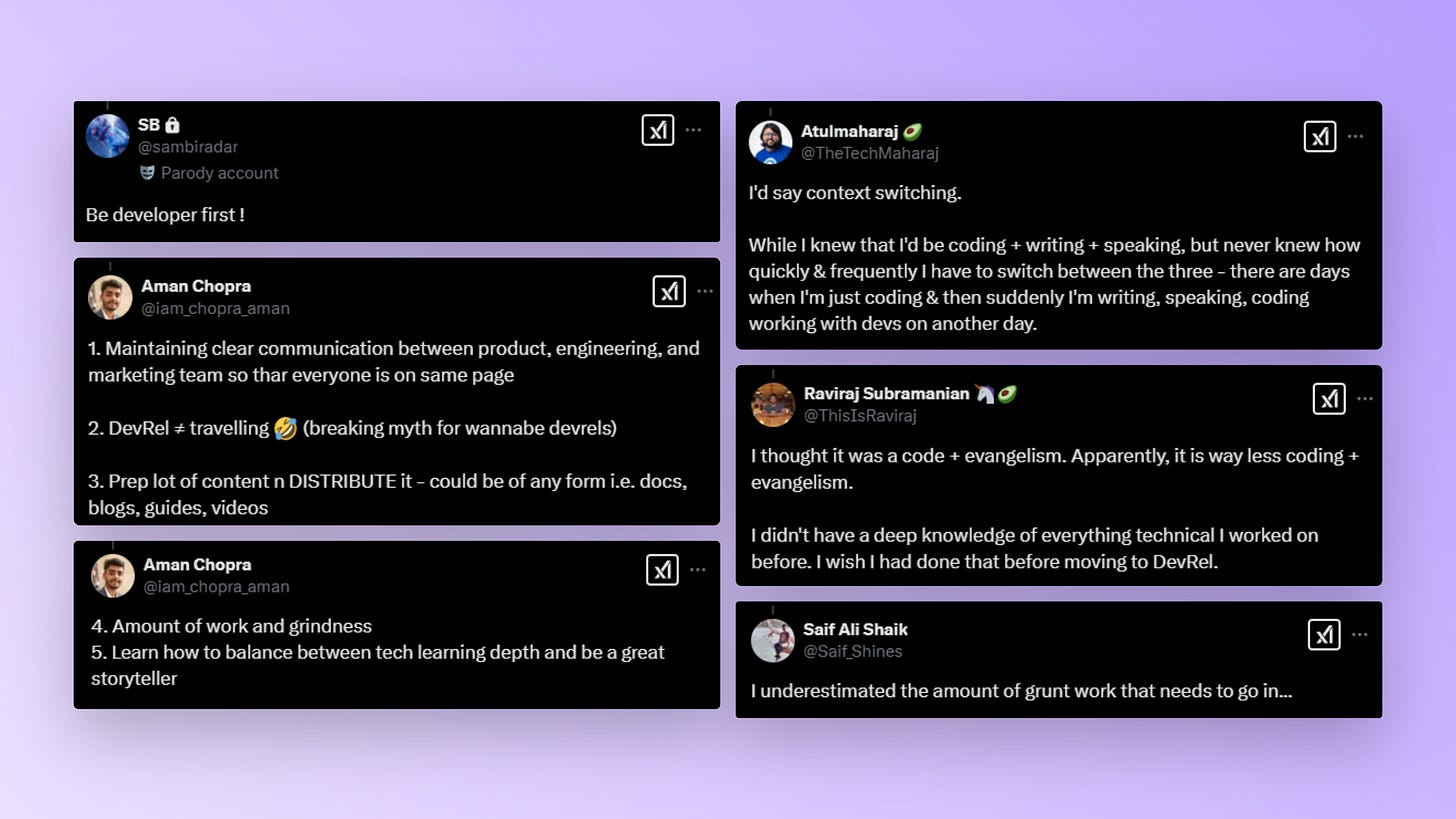One of the most common questions I receive from people when I am engaging at community events or chatting on social media is how they can start their careers in Developer Relations. What a lot of people, however, do not realize at this point are the complexities and the idiosyncrasies of the DevRel umbrella. For example, even today, a lot of people I meet believe that DevRel roles do not require technical knowledge, which, in fact, is not true. Therefore, in the latest issue of my newsletter, I want to talk about a number of “truths” that I wish I would have had before starting my first job in DevRel 3.5 years ago.
What The Community Thinks 👨👩👧👦
Before I share my opinions, I thought it would be best to ask the community what they think and if there are any truths or facts that they would have appreciated knowing before they started their DevRel careers. So I went out on Twitter and asked people what they think, and we got some particularly fascinating answers.

Some “Truths” I Wish I Had Known 😌
All of this conversation on Twitter really tells me that we all have had some “truths” as DevRel professionals that we would have appreciated knowing before we jumped into this domain. Here is my list:
1. DevRel is More Than Just Talks & Swag
Many people in the developer community today assume that DevRel is all about speaking at conferences, hosting meetups, and handing out t-shirts, stickers, and other company swag. In truth, DevRel expands far beyond these tasks; as DevRel professionals, we are actively involved in creating educational content, developing community programs, engaging in support activities, advocating for our audience and community members within our companies, building sample applications and internal tools, conducting user research, and (sometimes) even more.
In simple words, we do a shit ton of work!
2. Your Metrics Will Be Questioned (A Lot!)
Truth be told, a lot of companies still struggle to measure the impact of their DevRel teams. This is a consequence of the fact that a lot of companies only built these teams looking at their competitors, the recommendations of their investors, or as a misguided effort to attract a developer audience. Therefore, you will often have to go out of the way to justify your work with metrics beyond vanity numbers such as Twitter followers, event attendees, or likes on a social post.
You should align your DevRel team goals with business outcomes such as developer adoption, retention, and engagement, as these outcomes are more easily quantifiable and have a much more direct impact.
3. You Can’t Make Everyone Happy
Truthfully speaking, you're not going to fulfill every request and make every developer in your community happy. Developers are just regular people who often come from different walks of life and carry different sets of experiences based on their environment, which will cause them to have a diversified set of needs on the whole. Unfortunately, what this means is that some people will love your work, some will absolutely hate it, and some just won’t care.
Try to prioritise constructive feedback and set boundaries to ensure you maintain your mental well-being.
4. DevRel is Not Just Travel
One of the most common DevRel tropes on social media is that DevRel professionals are constantly flying around the world and living a luxurious life. This is simply not true! In truth, most of my effective hours are spent online on my computer, working on content, sample apps, community initiatives, etc., all in one room.
If you love travel, that is great! But please don’t assume it’s mandatory. Most DevRel roles do not require travel more than 25% of the time.
5. Excessive Context Switching is Draining
DevRel will require you to wear multiple hats. I have spent days where, one moment, I am developing a new integration, another moment I am working on a blog post, and a third I am joining a meeting about a new community program. Constantly switching tasks will hurt your focus and productivity, which also leads to mental fatigue a lot quicker.
There are a few ways to tackle the mental drain of excessive context switching. You can batch similar tasks together; for example, block out a few hours on your Calendar (focus time) to work on content or write coding. You can also set communication boundaries (for example, shut off Slack or Teams when you’re taking focus time) and use async communication wherever possible.
6. Burnout is Very Real
There are times when this mix of content creation, community engagement, internal meetings, travel for events, etc., can make you feel overwhelmed and lead to burnout, too.
I would strongly suggest learning to say no without guilt and pace yourself (it’s okay to skip out on that one random meetup every once in a while). Also, make better use of your PTO, take time off after working weekends (conference staffing, events travel, etc.), and generally set better work-life boundaries so that you get time to recuperate.
7. Internal Advocacy is Just as Important as External Engagement
Remember how I shared earlier about this misunderstanding in the community of what DevRel teams actually really do? Yeah, you're gonna have the same problem internally as well. Truth be told, your team members are also humans who may not be aware of the nuance of every single piece of work you do. Sometimes, these misunderstandings and confusions can cause internal conflict simply because there is a lack of clarity on how each team can collaborate with you.
It is your responsibility to build strong internal relationships and educate and align with internal teams, whether that is marketing, product, sales, or engineering. This will help you go a long way, where each team understands the impact you make, which will help you enable each other to succeed much quicker.
8. Your Personal Brand Matters More Than You Think
As much as a lot of us like to believe that the value we create does not have to be represented by the likes we get on a post or the number of followers we have on a platform, the truth is that a strong personal brand will help you get better career growth and opportunities. Being active on platforms such as Twitter, LinkedIn, Dev.to, local communities, etc., will allow you to network better and open doors quickly.
Just remember that it isn't about having that one big, impactful activity; rather, you have to be consistent, create content regularly, and play the long game to really develop your brand.
9. You Must Maintain Your Technical Skills
As a DevRel professional, remember that all the work you do is intended to enable developers at the end of the day. As a Developer Advocate, when I create educational content or develop certain community programs, there is a high chance that I will be working on example code or building internal tools to help enable these initiatives. Therefore, unless your role specifies otherwise, you will have to maintain a certain level of hands-on technical expertise, even if it isn't a part of your day-to-day work.
The easiest way to maintain my technical skills is to develop side projects. This allows me to keep my hands active while also building ideas I want to invest my time in, making it a win-win!
10. Be Ready to "Take Out the Trash"
In DevRel, you’ll have to hide from the spotlight and focus on “boring” but necessary tasks, like answering support tickets, moderating forums, setting up demo environments, or even troubleshooting event logistics (I have sat in dusty little corners of stores waiting for standees to print, only to find the wrong size being printed). A lot of this work is not very glamorous, but it enables a much better experience for your community members. My suggestion is to embrace these “small” responsibilities because they really do add up in the “big” picture.
Not everything is glamorous, but these tasks help build trust and credibility.
Do I Still Like DevRel? 🥑
After thinking of all of these fruits, the big question that I have to ask myself is, do I still enjoy DevRel as a career? The answer is an outstanding yes! I absolutely love the work that I do every day as a Developer Advocate. It's so fulfilling to help developers succeed in building their applications and software,e and I truly value the friendships I have been able to build as a part of this career.
While this role constantly keeps me on my toes, and because tech doesn't stop evolving, I can never stop learning. However, I savour every moment I get to support my developer community. I really hope to see more people grow into this career, and as we see more developer tools enter the market, hopefully, it will allow DevRel to mature as a career option and offer better career ladders at the developer-facing companies we see in the ecosystem today.









